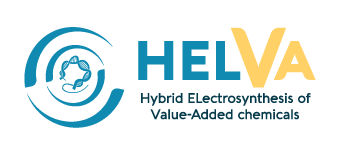Coordinated by ICFO, the HELVA project aims to develop a novel technology based on hybrid tandem reactors that will produce bioplastics from CO2 waste. The project seeks to convert CO2 into acetate that will then be upgraded into bioplastic precursors (PHA) with the help of genetically modified bacteria.
The Problem: Fossil Fuel Dependency and Unsustainable Plastics
Modern society and industry heavily rely on carbon-based molecules for producing materials vital to numerous sectors, such as construction, automotive, electronics, pharmaceuticals, textiles, food packaging, and transportation fuels. Furthermore, we primarily obtain these molecules from fossil fuels through energy-intensive thermochemical processes, which, in turn, emit greenhouse gases, especially carbon dioxide (CO2).
To illustrate, the extreme use of plastics exemplifies the world’s dependence on fossil fuels, since the entire production and consumption cycle relies on petroleum. Consequently, this dependence poses significant challenges for mitigating global warming and building sustainable circular economies.
The Solution: HELVA’s Innovative Approach to Bioplastics
HELVA, a new European project led by ICFO, aims to transform CO2 into sustainable and biodegradable plastics. The project developers seek to create a new conversion technology with a 2-step approach. First, they will capture CO2 from the atmosphere and water and then transform it into acetate through a CO2 electroreduction (CO2R) process.
This process will harness renewable electricity from solar and wind power. Acetate, a type of salt that forms when acetic acid (known as the main component of vinegar) combines with a base, has widespread use in several industrial sectors for the production of paint, glue, and plastics. In the second step, genetically modified microbes in bio-reactors will transform the resulting acetate into polyhydroxyalkanoates (PHAs). PHAs are a type of polymer that serves as the precursor for biodegradable plastics.
Selective CO2R presents significant limitations in generating complex substances like polymers, polyesters, fatty acids, and sugars. Researchers and engineers still face issues regarding selectivity towards targeted products and achieved current density in the electrosynthesis of acetate as an intermediate feedstock. Notably, the presence of non-desired by-products such as formate, methanol, or ethanol could damage microbial systems that convert acetate into PHA.
HELVA’s Innovative Approach to Sustainable Plastics
To achieve these objectives, HELVA will explore new materials and design innovative catalysts that offer the required selectivity and productivity for acetate production. The consortium also aims to develop genetically engineered microbes (Escherichia coli strains) capable of upgrading acetate into PHAs with rates and purities that ensure the technological and economic viability of the process. The project team will develop the technology to integrate CO2 electroreduction to acetate and the subsequent bio-driven upgrade to PHAs, thereby addressing the limitations of both processes.
International Collaboration for a Greener Future
Prof. Pelayo García de Arquer from ICFO coordinates the HELVA consortium. An interdisciplinary team of researchers from the Lodz University of Technology (Poland) and the University of Sâo Paulo (Brazil) comprise the consortium. The project team held the project’s kick-off meeting online on 19th October. The Agencia Estatal de Investigación (AEI, Spain), the National Science Centre (NCN, Poland), and the Sâo Paulo Research Fundation (FAPESP, Brazil) co-fund HELVA, a three-year project, within the Joint Transnational Call 2022 of the European-funded network M-ERA.NET 3.

